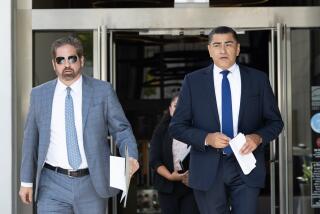Panel Upholds Ruling That Croton Lied About His Job
The Los Angeles Civil Service Commission on Monday unanimously upheld a hearing officerâs finding that cultural affairs chief Fred Croton lied on his city job application, setting the stage for the City Council to decide whether the department head should be fired.
The council today is scheduled to consider Mayor Tom Bradleyâs recommendation to fire the 53-year-old general manager. If the council agrees with Bradley, Croton would become the first city department head in decades to be dismissed.
The commission agreed with Civil Service Hearing Officer Mark Burstein, who concluded Wednesday after seven days of testimony that the evidence against Croton is overwhelming and that he had failed to credibly support his claim that he had worked in the early 1970s as the director of an East Coast arts foundation.
Decline a Recommendation
Despite their belief that Croton had lied to the city in his 1980 job application, the commissioners declined to recommend what action the City Council should take. Bradley last month urged Crotonâs firing on four grounds: three related to his job application and a fourth charging insubordination for failing to turn over his office keys and city-issued car quickly enough after being placed on a paid leave of absence from his $58,756-a-year job.
Trying to put the best face on the setback, Croton told reporters after the 90-minute commission hearing that he will reverse the tide against him when the council considers his ouster today.
âThe City Council (is made up of) mature men and women who understand a number of things, mostly politics,â Croton said. âThey know how to read between the lines, and what weâre hoping to do is to fill in those blanks for them.
âTheyâll find, I believe, the motivations behind this activity against me were politically motivated.â
Bradley placed Croton on a leave of absence Oct. 29. Since then, Croton and his attorney have protested that the proposed firing was the culmination of years of feuding between the general manager and a number of Bradley supporters. Bradley has denied the allegations.
The explanation that politics, not an erroneous job application, is the source of Crotonâs problems was not considered by Burstein, who said the issue of politics and job performance were unrelated to Bradleyâs charge that Croton had lied in his city job application.
Scathing Report
Burstein, in a scathing report issued last week, concluded that Croton, contrary to his claims, had not worked from 1973 to 1975 as the full-time director of the Sharon Creative Arts Foundation in Sharon, Conn., at an annual salary of $24,000. Burstein also rejected Crotonâs explanation that he had served as a âshadow directorâ at the behest of two foundation supporters. One of the supporters is dead and the other was in poor health and did not testify at the hearing.
Crotonâs explanation was meant to refute several witnesses from Connecticut who testified that Croton had played a minor role in the arts foundation, had never been its director and had received no salary.
In accepting Bursteinâs findings, Commissioner Raymond Fisher said that âit borders on the fantastic that Mr. Croton was unable to present one piece of documentary evidenceâ to support his claims. Fisher said Crotonâs unwillingness to admit the errors on the application amounted to a âcharacter flaw.â
No Records
Croton told commissioners in a statement that he has moved several times since leaving the Sharon, Conn., area and can find no written records to substantiate his claims.
âThose documents simply were not available to me,â Croton told the commission. âAll I can tell you is that the work I performed in Sharon was consistent with what I placed on my application.â
The Civil Service Commission members also rejected Crotonâs defense that political considerations were at the heart of Bradleyâs decision. Questions of honesty and integrity, not politics, were the issue, the commissioners said.
âI view this whole case as a tragedy,â Commissioner Alan Friedman said. âThe center of your argument was that you were a âshadow director.â The evidence is so overwhelmingly to the contrary, that it seems to me, as one commissioner, that the city has met its burden despite the skepticism . . . that I personally approached in the case because of passage of time.â
Commissioner Anthony de los Reyes told Croton that the commission was bent on âensuring fairness in the process.â
More to Read
Sign up for Essential California
The most important California stories and recommendations in your inbox every morning.
You may occasionally receive promotional content from the Los Angeles Times.










